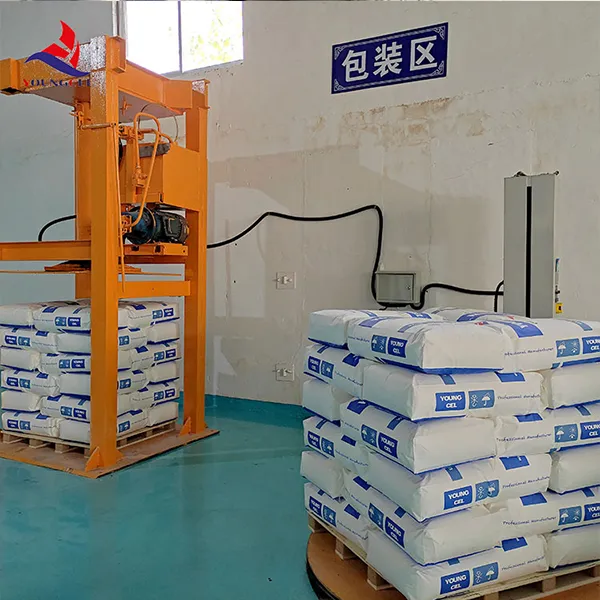Understanding Thickeners The Role of Tylos in Food and Industry
Thickeners play a crucial role in a variety of applications, particularly in the food industry, where they enhance the texture and consistency of products. One such powerful thickening agent is Tylos, more formally known as hydroxypropyl methylcellulose (HPMC). This cellulose-based polymer has garnered attention due to its versatility, effectiveness, and safety, making it a staple in numerous formulations both in food and other industries.
The Science Behind Tylos
Tylos is derived from cellulose, a natural polymer found in the cell walls of plants. Through a chemical process involving the modification of cellulose, Tylos is created, offering enhanced properties that make it useful as a thickener, emulsifier, and stabilizer. This modification allows Tylos to retain water, which is fundamental in creating the desired viscosity in various products.
The thickening capacity of Tylos is not just about making products thicker; it also affects their overall sensory appeal. In food products, for example, a proper viscosity can improve mouthfeel, contribute to the overall flavor experience, and maintain product stability over time. Tylos achieves this by forming a gel-like structure when mixed with water, which can provide that perfect creamy texture in sauces, dressings, and baked goods.
Applications in the Food Industry
In the food sector, Tylos is commonly used in a range of products. For instance, it is a popular ingredient in gluten-free baking, helping to mimic the texture that gluten provides. When used in bread, it can improve the moisture retention, shelf life, and overall structure, which are often challenging in gluten-free formulations.
Furthermore, Tylos is also employed as a thickener in sauces, soups, and gravies, where it helps create a consistent and appealing texture. Its ability to easily dissolve in cold and hot water makes it an ideal choice for manufacturers looking for a reliable thickening agent without compromising quality. Additionally, Tylos is often incorporated in salad dressings to achieve that rich, creamy consistency that consumers crave.
thicken tylos

Beyond Food Industrial Applications
The benefits of Tylos extend beyond the food industry. In pharmaceuticals, it serves as a binder and release agent in tablets and capsules, enhancing the efficacy and stability of medicinal formulations. Moreover, Tylos also finds use in personal care products, where it can act as a thickener in lotions and creams, providing a desirable viscosity while ensuring even distribution upon application.
In the construction industry, Tylos is utilized to improve the workability of cement and mortars. It helps to retain water, allowing for better adhesion and less cracking as materials cure and dry. This versatility underscores the wide-ranging applications of Tylos, showcasing its importance across various fields.
Safety and Regulatory Aspects
Considering its widespread use, it is essential to highlight the safety profile of Tylos. As a food additive, it is generally recognized as safe (GRAS) by regulatory bodies such as the FDA. Tylos does not pose significant health risks when consumed within established guidelines, making it an attractive option for food manufacturers. Additionally, its non-toxic nature and biodegradability contribute to its growing popularity among environmentally conscious consumers and producers.
Conclusion
In conclusion, Tylos, or hydroxypropyl methylcellulose, is a remarkable thickening agent with diverse applications across various industries, particularly in food, pharmaceuticals, and construction. Its ability to improve texture, stability, and sensory appeal makes it an invaluable ingredient for manufacturers seeking high-quality products. As consumer demands for healthier and more sustainable options continue to rise, the importance of versatile thickeners like Tylos is set to grow even further. Embracing such innovations will not only enhance product offerings but also align with the broader movement towards healthier and eco-friendly ingredients in today's market. Understanding and utilizing Tylos effectively can thus be seen as a significant step towards advancing product quality and consumer satisfaction in a rapidly evolving landscape.
-
A Comprehensive Guide to Methyl Ethyl Hydroxyethyl Cellulose: Applications and Industry InsightsNewsNov.24,2025
-
Understanding Methyl 2 Hydroxyethyl Cellulose: Uses, Benefits & Industry InsightsNewsNov.24,2025
-
Hydroxyethyl Methyl Cellulose HEMC: Industrial Uses, Benefits & Future TrendsNewsNov.23,2025
-
HEMC Cellulose: Versatile & Sustainable Industrial Polymer | YoungcelNewsNov.23,2025
-
Methyl Hydroxyethyl Cellulose: Versatile Building Block for Industry & SustainabilityNewsNov.23,2025
-
CAS 9032 42 2: Understanding Polyvinyl Alcohol's Impact on Industry & SustainabilityNewsNov.22,2025




